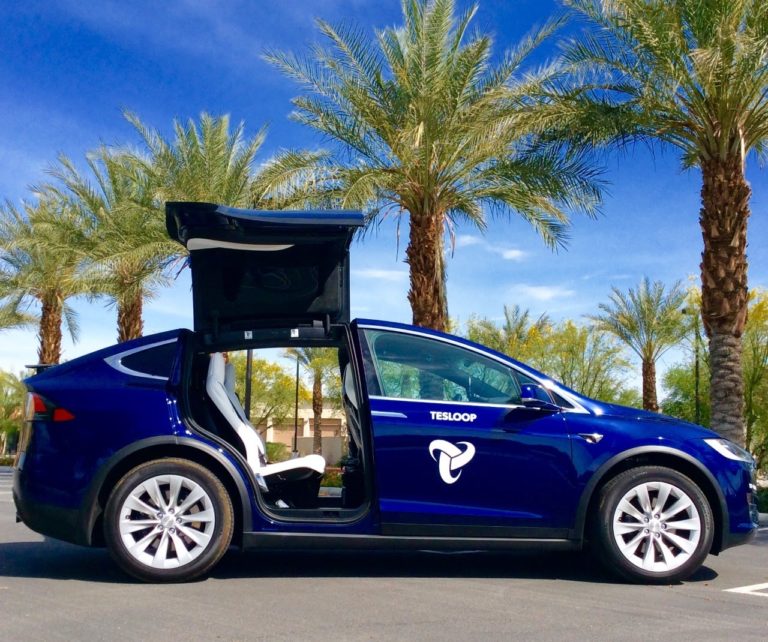
Long-haul commuting is better in a Tesla.
That’s the theory behind Tesloop of Culver City, a car service that ferries passengers on highway trips between 50 miles and 200 miles around Southern California in Tesla Inc.’s Model X or Model S cars.
The startup has seen a growth spurt in the past three months, more than tripling its number of Model X vehicles to seven; its fleet also includes one Model S sedan. Routes to Orange County and San Diego have also been added as well as a trip-booking mobile app.
Tesloop is aiming to create a service that competes with intercity transportation such as buses, trains and airplanes. The company does not aim to compete on short intracity trips with rideshare behemoths such as Uber Technologies Inc. and Lyft Inc.
Electric cars are much cheaper over long distances than gas-powered vehicles, said Rahul Sonnad, Tesloop’s chief executive.
“The electric drive train makes it three times cheaper per mile to move a Tesla when you include the cost of fuel and maintenance,” he said, noting that the company estimates a lifetime operating cost of 5 cents to 10 cents a mile. “The thing about the electric motor is it lasts many, many miles and you don’t have to (do much) maintenance.”
Tesloop aims to drive its cars much longer than the typical fleet vehicles to achieve those cost-per-mile targets. Its first car, the Model S, has logged nearly 300,000 miles since the firm’s launch in mid-2015. And Tesloop aims to keep it running until that sedan’s odometer hits 1 million miles.
“Our model is about high utilization,” Sonnad said. “We are driving the cars up to 17,000 miles a month.”
Tesloop has grown to more than 60 employees since its founding. In March, it raised a seven-figure seed round to finance growth initiatives, drawing from investors such as Inspiration Ventures, Clearstone Ventures and Global Trust Ventures.
The firm declined to disclose the exact amount of the round.
In a Snap
Some local startups are looking to capitalize on the popularity of Snap Inc.’s Snapchat.
Take FilterPop of Santa Monica, a startup that has received an undisclosed amount of funding from Science Inc. FilterPop has built an online marketplace for designers to sell geofilters – on-screen graphic overlays that can add a theme to or otherwise modify photos and videos – for Snapchat’s platform. The company claims revenue has grown to nearly six-figures a month since its launch in January.
FilterPop wants to accelerate that growth with the launch of a mobile app expected to hit the Apple App Store this week, pending approval.
The company’s geofilter marketplace is especially popular with consumers looking for Snapchat geofilters for weddings, birthdays and other celebrations, said Alex Kehr, the company’s co-founder and chief executive. A typical wedding geofilter costs about $35.
“Every design is customizable,” he said. “People can do different fonts, text effects, colors.”
The online marketplace features 1,300 geofilter designs from 400 designers, who receive a 50 percent commission from each sale. FilterPop collects the other half.
“There are a few (designers) that are earning $5,000 a month,” said Kehr.
Snapchat also has an online geofilter marketplace, but he said what differentiates his company’s platform is its ease of use and larger variety of designs. The eight-employee venture has plans to extend its marketplace to Facebook Inc.’s Instagram as well.
The startup also intends to offer a service tailored for businesses, such as brick-and-mortar retailers and restaurants, that want to advertise on Snapchat to nearby consumers, added Connor Smith, FilterPop’s chief operating officer and co-founder.
Big-Screen Gaming
Recreational video-game league Super League Gaming has raised a $15 million Series C round from investors including Viacom Inc.’s Nickelodeon, DMG Entertainment, SoftBank ISAT and Peter Guber’s aXiomatic, according to a statement.
The Santa Monica-based startup runs recreational tournaments for video games “Minecraft” and “League of Legends” in movie theaters and online. It has raised more than $28 million since forming in 2014, with earlier participation from investors including Cinemark USA Inc., ET Capital and Quadrant Management.
Super League plans to use its additional funds to expand to 16 cities from its current 12 locations in North America, said Chief Executive Ann Hand.
The company also plans to operate overseas.
“We specifically started to look at two cities, perhaps four cities, by the year end to help enable a China version of Super League,” Hand said. “We also have our eyes on Europe.”
The company said it has now hosted more than 30,000 people in competitions, most of whom are kids (see related story, page 1).
Staff Reporter Garrett Reim can be reached at [email protected] or (323) 549-5225, ext. 232.
